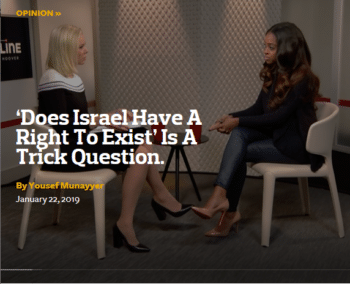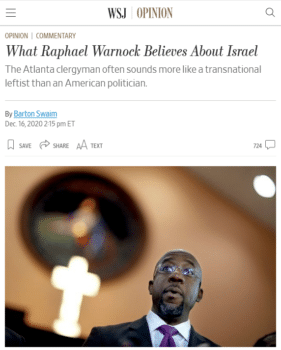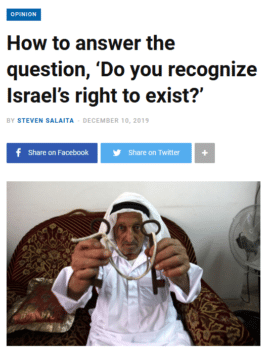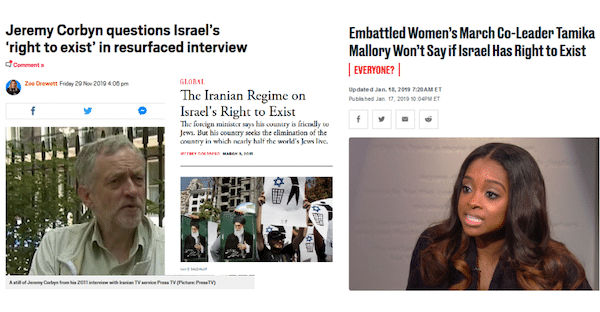
“I’ve never heard anyone demand to know whether Switzerland, or even the United States, has ‘a right to exist,’” writes Yousef Munayyer in the Forward (1/22/19).
No state has an intrinsic “right to exist.” As international relations scholar Scott Burchill points out, there is no abstract “right to exist” in international law, or in “any serious theory of international relations.” Nor is it customary, Burchill explains, for states or sub-state groups to recognize a state’s “right to exist.”
“States,” writes the author Yousef Munayyer (Forward, 1/22/19),
don’t exist because they have a “right” to. They exist because certain groups of people amassed enough political and material power to make territorial claims and establish governments, sometimes with the consent of those already living there and, oftentimes, at their expense.
In stories on Israel/Palestine, however, media outlets regularly draw attention to whether Palestinians and their supporters recognize an Israeli “right to exist.” I used the media aggregator Factiva to search for “Israel’s right to exist” in material the New York Times, Wall Street Journal and Washington Post have run between January 1, 2000, and February 2, 2021, the time of writing. Between these three newspapers, the phrase appears in a combined 1,358 pieces. Given the frequency with which it appears, this aspect of discussions about Israel/Palestine merits examination.
In the Washington Post (1/20/21), to take one recent example, Daniel W. Drezner wrote a deeply critical assessment of Trump’s legacy but said, “Are there positive accomplishments the Trump administration can take credit for? Sure. Every administration has their concrete achievements.” Among these, Drezner asserted, is that “a few more countries recognize Israel’s right to exist than before.”

Barton Swaim (Wall Street Journal, 12/17/20) complains that Raphael Warnock—then a candidate, now a senator—”seems to believe that saying Israel has a right to exist somehow counterbalances his defamations” (i.e., his criticism of Israel).
As I’ve shown in FAIR (9/26/20), Trump’s chief “achievements” in these deals were opening the door to weapons proliferation, escalating the risk of war and entrenching colonialism: The United Arab Emirates, Bahrain and, more recently, Morocco and Sudan “recognizing Israel’s right to exist” meant cementing a belligerent military alliance against Iran, and facilitating the further dispossession of and violence against Palestinians—and, in Morocco’s case, the Saharawis of Western Sahara (Haaretz, 12/11/20).
Counterbalancing ‘defamations’
During Democrat Raphael Warnock’s successful campaign in Georgia’s Senate runoff, Barton Swaim of the Wall Street Journal (12/17/20) condemned Warnock for his criticisms of Israel, writing:
Mr. Warnock seems to believe that saying Israel has a right to existsomehow counterbalances his defamations…. What country other than Israel needs its “right to exist” asserted?
For Swaim, “saying Israel has a right to exist” isn’t yielding to an Israeli position, but the political equivalent of declaring that gravity is real. What the Journal editorialist does here is establish anti-Palestinian parameters of discussion: For him, the implications of “saying Israel has a right to exist” are not matters of debate.
What does need to be talked about, in Swaim’s view, is Warnock’s failure to recant “defamations,” like comparing Israel’s illegal West Bank separation barrier to the Berlin Wall. (Israel’s wall is much bigger, for one thing: currently 289 miles long and up to 30 feet tall, while the Berlin Wall was 88 miles long and 12 feet tall.) Another apparent smear is Warnock’s belief “that Israel systematically brutalizes innocent Palestinians,” which is not so much Warnock’s opinion as it is an incredibly well-documented set of facts.
A further “defamation” is that Warnock signed a National Council of Churches letter that supposedly compared Israel to the Nazis and Israel’s crimes against the Palestinians to slavery. What the letter actually said was that Christians should speak out against injustices done to the Palestinians, citing instances when the authors believe Christians failed to mount sufficient opposition to injustice. Here’s the relevant passage:
We admit that silence in the face of injustice is complicity. Indeed, there were many Christians that were silent and closed their ears against the sound of the deadly apartheid jackboot in the lives of South African blacks. There were whole communities of Christians who not only condoned the untold dehumanization of people through slavery, but who thrived on that evil, and their slavery-sourced head-start has become the silent normal of today’s social and economic landscape of the world. Communities and neighborhoods in Europe were silent and complicit to the horror of the Holocaust. We shall not and cannot be silent.

In two sentences, Israeli Ambassador Gilad Erdan (Newsweek, 11/30/20) segues from “the Palestinian refusal to recognize our right to exist as the world’s only Jewish state” to the idea that “we have no right to even be present in Jerusalem”—as if the one implied the other.
Thus, Swaim—who noted that Warnock has recanted his previous support for the UN-endorsed characterization of Israel as an apartheid state (Reuters, 3/15/17)—has changed the subject from the political arrangement that exists in Israel/Palestine, and what a better one might entail, to a tendentious reading of a letter written by a U.S. ecumenical group, one that happens to “support a two-state solution in which a safe and secure State of Israel will reside next to a safe, secure, viable and contiguous State of Palestine,” though Swaim made no reference to that section.
Goalpost shifting
In a similar case of goalpost shifting, Newsweek (11/30/20) ran a piece by Gilad Erdan, Israel’s ambassador to the United Nations and now also Israel’s ambassador to the United States. Erdan asserted that the United Nations insists on “only” referring to the Temple Mount by its Muslim name, Haram al-Sharif. (Search “Temple Mount” on the UN’s webpage and you get 254 results compared to 329 for Haram al-Sharif; most UN documents seem to use both its Jewish and its Muslim name.)
On the basis of this false claim, Erdan wrote that “by ignoring our 3,000-year link to the Temple Mount, the UN validates the Palestinian refusal to recognize our right to exist as the world’s only Jewish state.” Here Erdan suggests that Jewish peoples’ connection to the Temple Mount necessarily translates not only into Israel having a “right to exist,” but a “right to exist as the world’s only Jewish state.”
This approach suggests that the “right to exist” extends to the right to be an ethno-state: At present, the state to which Erdan refers is “the world’s only Jewish state” in the sense that it discriminates against the indigenous inhabitants of the land because they are not Jewish. Perhaps most notably, it minimizes the non-Jewish population by preventing Palestinian refugees from exercising their legally protected right to return to their homes, while guaranteeing any Jewish person on Earth the right to settle the land and become Israeli citizens.
Erdan is hardly the only one to misleadingly conflate the state of Israel’s “right to exist” with Jewish peoples’ cultural, religious and human rights: Of the above-mentioned 1,358 pieces in the Times, Journal and Post, 83 refer to “Israel’s right to exist as a Jewish state,” or involve analogous phrasing.

Steven Salaita (Mondoweiss, 12/10/19): “’Do you recognize Israel’s right to exist?’ pretends to honor the downtrodden, but it is an altogether different proposition, transforming sophisticated ideas of liberation into a crude test of political respectability.”
Slipping between people and state
Such slippages between the Israeli state and Jewish people muddy exactly what one is being asked to recognize, which is precisely why the phrase “Israel’s right to exist” operates as an emotional sledgehammer. As Munayyer (Forward, 1/22/19) noted:
Factors like the unfortunate though all-too-often-commonplace conflation of the State of Israel with Judaism and world Jewry, coupled with the awful history of persecution Jews have faced, mean that anyone who doesn’t answer the question about Israel’s right to exist with an unequivocal “yes” risks being portrayed as an eliminationist radical worthy of labels like “antisemite.”
Author and scholar Steven Salaita (Mondoweiss, 12/10/19) pushes back against this approach, saying that
there are plenty of reasons to eschew the demand [to recognize Israel’s “right to exist”]. The first reason is practical: We don’t advocate for the destruction of human communities, but of ideologies conducive to racism and inequality. It’s both insidious and unethical to conflate Jewish people (of any national origin) with the existence of a violent, rapacious polity. That sort of conflation is a grave disservice to activists and intellectuals devoted to a better world—and to the communities for whom a better world is a necessity of survival….
I am happy, eager even, to affirm the right of Jewish people to live in peace and security, wherever that may be, a right all humans deserve in no particular order of worthiness. But I won’t ratify Israel’s bloody founding or its devotion to racial supremacy. Ultimately, when Zionists demand that you affirm Israel’s right to exist, what they really seek is affirmation of Palestinian nonexistence.
BDS = antisemitism
This manifestation of the “right to exist” issue is especially live in coverage of the movement to boycott, divest from and levy sanctions against Israel (BDS). NPR (11/19/20), for example, wrote that “some supporters of BDS deny Israel’s right to exist as a Jewish state, which has led Israel’s leaders to label the movement both antisemitic and an existential threat.” The article gave voice to BDS activists pointing out that mislabeling the campaign in general as antisemitic “has been condemned by dozens of Jewish groups worldwide and by hundreds of leading Jewish and Israeli scholars, including world authorities on antisemitism and the Holocaust.” However, the specific claim from “Israel’s leaders” that “deny[ing] Israel’s right to exist as a Jewish state” is antisemitic was not explicitly challenged.

NPR (11/19/20): “Some supporters of BDS deny Israel’s right to exist as a Jewish state, which has led Israel’s leaders to label the movement both antisemitic and an existential threat.”
It was, however, challenged days ago in a mainstream Israeli newspaper (Haaretz, 1/30/21), when journalist Gideon Levy wrote:
One can regard Zionism as racism without being suspected of being antisemitic. It’s inconceivable that those combating racism be condemned as racists of the antisemitic brand. From the Law of Return to the nation-state law, from the ethnic cleansing of 1948 to the ethnic cleansing of the Jordan Valley and the southern Hebron hills in 2021, this is the brief summary of Zionist history. Is this not racism?
The reality of apartheid and Jewish supremacy from the Jordan River to the sea is hidden only from the blind, the ignorant, the propagandists and the liars.
The BDS movement does not wish to destroy Israel, only to replace its regime of Jewish supremacy; the Palestinian right of return is not meant to throw the Jews into the sea; the one-state solution is not meant to repatriate the Jews to Europe. All of these only wish to partially and belatedly repair an historic wrong wrought by Zionism, deliberately or not, a correction without which no belated justice will ever be established here.
In contrast, the New York Times (12/12/20) published an article about artists and intellectuals in Germany who questioned the effects of the German Parliament’s May 2019 resolution designating BDS a form of antisemitism and “call[ing] on all Germany’s states and municipalities to deny public funding to any institution that ‘actively supports’ the movement, or questions the right of the state of Israel to exist.” This is one of three passages in the article connecting the questioning of Israel’s “right to exist” with antisemitism,, the other two being statements from German officials.
The piece’s only counterpoint was its account of Yehudit Yinhar, a Jewish-Israeli student at a German art school who was accused of antisemitism for helping organize a project called “School for Unlearning Zionism.” Yinhar’s case illustrates the pitfall of assuming that the state of Israel is an essential feature of Judaism—comparable, perhaps, to assuming that the state of Myanmar embodies Theravada Buddhism. Readers who know that opposing Zionism is more or less equivalent to challenging Israel’s “right to exist as a Jewish state” will glean that Yinhar’s story functions to partially balance the assertions that critics of Zionism are inherently antisemitic. Yet there is no voice in the article that directly questions that repeated equation.
Cementing supremacy

Israel’s leading human rights group (B’Tselem, 1/12/21) declaring Israel/Palestine to be apartheid regime was not seen as newsworthy by the New York Times or Wall Street Journal.
While the Times, like the Wall StreetJournal and Washington Post, has a longstanding interest in what Palestinians and their allies say on the “right to exist” question, the publications have had scant interest in a recent, high-profile demonstration of what that existence looks like. On January 12, the Israeli human rights group B’Tselem issued a report concluding that Israel maintains an apartheid system across all of historic Palestine, meaning both in what is presently called Israel as well as in the West Bank and Gaza:
More than 14 million people, roughly half of them Jews and the other half Palestinians, live between the Jordan River and the Mediterranean Sea under a single rule. The common perception in public, political, legal and media discourse is that two separate regimes operate side by side in this area, separated by the Green Line. One regime, inside the borders of the sovereign State of Israel, is a permanent democracy with a population of about 9 million, all Israeli citizens. The other regime, in the territories Israel took over in 1967, whose final status is supposed to be determined in future negotiations, is a temporary military occupation imposed on some 5 million Palestinian subjects.
Over time, the distinction between the two regimes has grown divorced from reality…. The entire area between the Mediterranean Sea and the Jordan River is organized under a single principle: advancing and cementing the supremacy of one group—Jews—over another—Palestinians.
The Post mentioned the B’Tselem’s document just once (1/12/21); neither the Times nor the Journal have reported on the group’s findings a single time.
An unhelpful question
Coverage that asks whether Palestinians and pro-Palestinians acknowledge Israel’s “right to exist” poses an unhelpful question. The far more concrete, constructive and urgent one is: What is a fair arrangement under which all the peoples of historic Palestine can live? Borders shift, states come into and out of being—did Yugoslavia have a “right to exist”?—and countries change political systems. Jim Crow once existed in the American South, and apartheid once existed in South Africa, but these systems have been replaced. Yet, as Munayyer (Forward, 1/22/19) writes:
White and Black populations [continue to exist in each place], and they both exercise self-determination through equal rights to the vote. What no longer exists are the overt and systemic policies of Apartheid and Jim Crow…even though much work remains to achieve real equality in both places. We should fight for that outcome in Israel/Palestine, where the rights of all people to freedom, justice and equality come before the so-called “rights” of any state to deny them.

